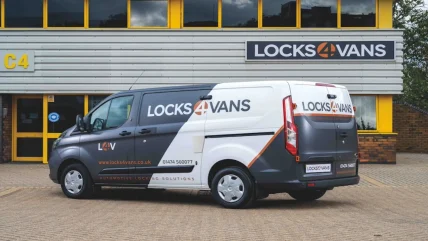
Since opening its Innovation Centre in Gravesend, Kent in 2021, LCV security specialist Locks 4 Vans has taken its business to another level.
The facility resulted from an investment of £2.5m, with the project being overseen by Chris Battersby, who founded Locks 4 Vans as a one-man band 20 years ago and who sadly died this year.
The centre has been transformative for Locks 4 Vans, enabling it to anticipate light commercial vehicle attack methods and to deliver security solutions to mitigate the risk of theft for its customers. It now has the capability, in-house, to rapid-prototype, which has reduced the lead time for solving a security problem from weeks or even months to just days. With the new Innovation Centre underpinning its business, Locks 4 Vans has the capacity to identify criminal activity by the monitoring of external feedback and to identify potential attack methods by scrutinising the vulnerabilities of vans in-house to stay one step ahead of the criminals targeting light commercials.
Once Locks 4 Vans’ engineers have identified a van’s vulnerabilities, they look for an effective solution by using CAD (computer-aided design) to bring an idea to life. Combined with 3D-scanning technology, they can advance an idea to the 3D printing and fabrication stage in the workshop to produce a prototype, which is then tested in the Corrosion Testing Chamber. If the prototype works it is then sent to production, with more than 80% of components being sourced from within a 20-mile radius of the centre, according to Locks 4 Vans.
For a firm such as Locks 4 Vans to remain effective it must not stand still, security products tend not to have a long shelf life as thieves intent on stealing vans or their contents remain adaptable and continuously find ways to overcome them.
“Keeping ahead of criminals is a challenge,” admits Terry Rayner, commercial director, Locks 4 Vans.
Styling changes to vans can mean the security products previously fitted no longer do the job. Rayner says some products can become obsolete after a period of three months.
Locks 4 Vans has to be ingenious in finding vans to test its products on. Following a spate of attacks on Mercedes Sprinter vans, for example, it was struggling to get hold of one to work on, says Rayner, so borrowed one from an electrical company based on the same business park as its Innovation Centre.
The firm has recently developed locks for camper vans that can be operated from inside the vehicle without activating the alarm, having been alerted to incidents where the vans have been broken into while someone was asleep inside.
“If a company wants a problem solved, we tend to say yes,” says Rayner.
Rayner says Locks 4 Vans faces a “constant dilemma” in how much it reveals about its security products, “not so much [to] the competition but the criminals” who could use the information to devise ways to bypass the systems.
Aside from hidden locks and shields designed to thwart puncture attacks or the ‘peel and steal’ method of attack, another deterrent is to fit locks prominently on an LCV’s exterior or to post a warning about the presence of alarms or cameras to put off thieves before they start to make any damage to the vehicle. The idea is to persuade criminals an attack would be “too much hassle” explains Rayner. He acknowledges, however, that the old notice; ‘no tools left in this van overnight’ is now widely ignored.
Livery has obvious benefits to businesses in turning their vans into mobile billboards and in ensuring drivers uphold the reputation of the company while on the road but from a security point of view it can also be something of a liability, observes Rayner, by advertising the contents of the load bay.
A pharmaceutical company’s van, for example, could contain £250,000 worth of drugs, he says. The growing popularity of home deliveries also means there are now more rich pickings for thieves to find in vans, Rayner adds.
A major challenge for Locks 4 Vans now is in devising effective protection for electric vans, which are built with more lightweight, and potentially less robust, materials than ICE vans to compensate for the loss of payload imposed by the battery weight. The ability to test new security products on CAD models rather than drilling into vans is invaluable in this work, says Rayner.
Taking a prominent position on Locks 4 Vans’ stand at the CV Show was an electric Volkswagen ID Buzz Cargo, for which the firm has developed a range of security products that take into account the composite materials from which it is constructed.
Rayner says 90% of Locks 4 Vans business is in the UK but it is starting to make products for vans marketed in continental Europe where it is working with Renault, for example.
Half of the firm’s security products are installed in new vans through contracts with leading brands, such as Ford and the other half are “reactive” aftermarket products, which are developed to combat new methods of attack, explains Rayner.
“Our marketing tries to persuade customers to get protected before it happens,” he says.
For Locks 4 Vans, staying one step ahead is the name of the game.





